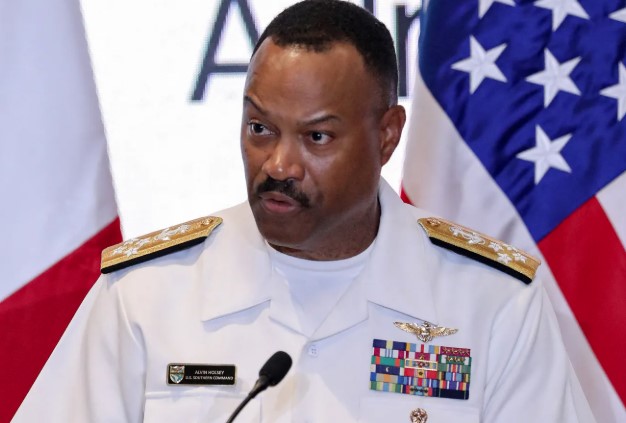A senior U.S. Navy officer overseeing aerial attacks on Venezuelan waters has stepped down amid reports that some targeted boats survived recent strikes. Admiral Alvin Holsey, a 37-year veteran of the Navy, will retire by the end of the year, Secretary of War Pete Hegseth announced on social media platform X.
Admiral Holsey Retires After Controversial Strike Operations
Hegseth praised Holsey’s career, noting that he commanded helicopter squadrons, led Carrier Strike Group One, and helped establish the International Maritime Security Construct. “Admiral Holsey has demonstrated unwavering commitment to mission, people, and nation,” Hegseth wrote.
Holsey’s recent position was expected to last three years, but he served less than a year, according to reports from the New York Times. While the Navy did not provide a detailed reason for his early retirement, sources suggest Holsey may have had reservations about U.S. operations in Central and South America that targeted non-military vessels.
US Navy increases P-8 Poseidon patrols near Venezuela as Washington seeks to curb cartel trafficking
The timing of Holsey’s departure comes as U.S. strikes in the Caribbean reportedly left some intended targets alive. Officials confirmed that at least 27 people have been killed in these operations in recent weeks. One strike on Thursday left survivors, though their identities and conditions remain unclear, Reuters reported.
Details of U.S. Strikes on Venezuelan Boats
The U.S. government has described the ongoing operations as part of a campaign against Venezuelan narco-terrorist networks. President Trump and his administration have framed these groups as a direct threat, claiming they are responsible for smuggling drugs and even sending individuals with mental health issues into the United States.
President Trump announced that he had authorized the CIA to operate in Venezuela to support these efforts. These strikes involve aerial attacks targeting ships suspected of carrying illegal drugs or linked to criminal organizations.
Venezuela Arrest 6 Foreigners; Accuses US Navy SEAL of Assassination Attempt
Despite the U.S. administration’s statements, the attacks have faced international scrutiny. Venezuela’s ambassador to the United Nations reportedly requested that the U.N. Security Council condemn the operations as illegal. The incidents have drawn attention because, in at least one case, civilians or non-combatant crews appear to have survived, raising questions about the accuracy and impact of the strikes.
Officials have not clarified how many boats their forces targeted in each strike or what happened to all survivors. Reports show that these operations killed at least 27 people in recent weeks. U.S. officials say their forces focus on disrupting narcotics trafficking and follow legal and operational protocols.
Reactions and Career Highlights of Admiral Holsey
Admiral Holsey has spent nearly four decades building his career, and military experts recognize him for his leadership and strategic planning in various roles. He commanded multiple helicopter squadrons, led a major carrier strike group, and helped develop international maritime security collaborations.
His early retirement has sparked discussions about the challenges of conducting military operations in regions with complex political and criminal landscapes. While officials have not given an explanation, reports suggest Holsey expressed concerns about targeting civilian or non-military vessels, reflecting the controversial nature of the recent strikes.
Dangerous Provocation: US Navy Submarine Triggers North Korea’s Outrage
The U.S. military continues its operations in the Caribbean and around Venezuela, emphasizing its focus on narcotics and security threats. Meanwhile, international observers and Venezuelan officials have raised legal and humanitarian questions regarding the strikes, especially given the reports of survivors and potential civilian involvement.
Holsey’s departure marks a significant change in leadership for the U.S. Navy in the region, highlighting the delicate balance between military objectives and ethical considerations during operations targeting non-traditional threats.
